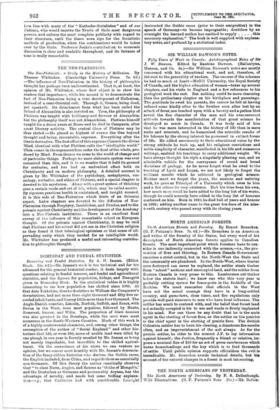THE NEO-PLATONISTS.
The Neo-Platcmists : a Study in the History of Hellenism. By Thomas Whittaker. (Cambridge University Press. 7s. 61.) —The influence of Nee-Platonism in the history of philosophic thought has perhaps been underestimated. That is, at least, the opinion of Mr. Whittaker, whose first object is to show his readers that importance, while his second is to demonstrate the fact of Neo-Platonism being a true development of Hellenism, instead of a semi-Oriental cult. Through it, Greece, being dead, yet speaketh. Its detachment from what has been called the School of Alexandria is also insisted on. True, the philosophy of Plotinus was taught with brilliancy and fervour at Alexandria, but the philosophy itself was not Alexandrian. Plotinus himself taught for a dozen years at Rome and be died in Campania, after great literary activity. The central ideas of Plotinus may be thus stated :—He placed as highest of causes the One beyond thought and being, inscrutable, supreme. Everything after the One is derivative. The first effect of this supreme cause is the divine Mind, identical with what Plotinus calls the "intelligible world." Then comes in the supraniundane order the Soul of the whole, pro- duced by Mind. From thence we come to the world of change and of particular things. Perhaps no more elaborate system was ever conceived than this, and it is no wonder that it held its ground for centuries, and has had an undoubted effect both on Christianity and on modern philosophy. A detailed account is given by Mr. Whittaker of the psychology, metaphysics, cos- mology, msthetics, and ethics of Plotinne, and a special chapter is devoted to his mysticism. -Along with a great system of thinking goes a certain mode and art of I de, which may be called ascetic. By rigorous practices health is maintained, and insight secured. It is this side of Neo-Platonism which hints of an Oriental aspect. Later chapters are devoted to the diffusion of Neo- Platonism through Porphyry, Iamblichus, and Proclus, and to the polemic against Christianity and the development of the Academy into a Nee-Platonic institution. There is an excellent final survey of the influence of this remarkable school on European thought. Of the polemic against Christianity, it may be said that Plotinus and his school did not see in the Christian religion as they found it that teleological optimism or that sense of all- pervading unity which they needed for an intelligible world. 11,1r. Whittaker has produced a useful and interesting contribu- tion to philosophic thought.




















































 Previous page
Previous page